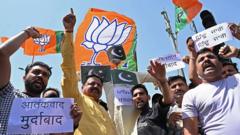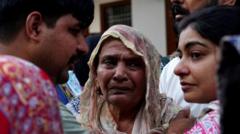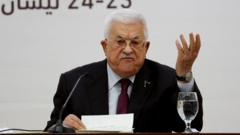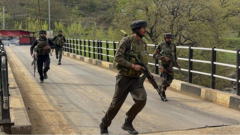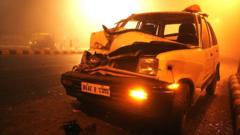In response to a recent militant assault that resulted in the deaths of 26 tourists in Kashmir, Pakistan has enacted immediate travel restrictions by suspending all visas for Indian nationals previously issued under an exemption scheme. This decision coincides with the closure of its airspace to Indian flights and expulsion of several Indian diplomats as diplomatic relations deteriorate between the neighboring countries.
**Tensions Escalate as Pakistan Suspends Visas for Indians Following Kashmir Attack**
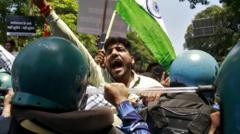
**Tensions Escalate as Pakistan Suspends Visas for Indians Following Kashmir Attack**
Pakistan reacts with strict measures against India amid rising tensions after a deadly attack on tourists in Kashmir.
The attack, carried out at the popular Pahalgam resort, involved gunmen from the Pakistan-based militant group, Lashkar-e-Taiba (LeT). Indian authorities have named three of the alleged gunmen, confirming two are Pakistani citizens while one is a local. Pakistan's National Security Committee has dismissed claims linking the incident to their involvement, asserting a lack of evidence or credible investigation.
Indian Prime Minister Narendra Modi has decried the attack, pledging a resolute pursuit of the attackers and their supporters, stating that they will face severe repercussions. Following the incident, India announced several countermeasures, including the closure of the Attari-Wagah border and halting visa services for Pakistani nationals.
Pakistan has also rejected India's suspension of the Indus Water Treaty, warning that such acts would be considered acts of war. Tensions on the ground remain high, with approximately 1,500 individuals detained for questioning in Kashmir, where a state of unease persists.
The attack has deeply affected the victims' families, with emotional farewells being held for those who lost their lives. In the aftermath, there have been alarming reports of Kashmiri students facing harassment in various parts of India, prompting concerns about further escalation of communal tensions as these incidents unfold.
Indian Prime Minister Narendra Modi has decried the attack, pledging a resolute pursuit of the attackers and their supporters, stating that they will face severe repercussions. Following the incident, India announced several countermeasures, including the closure of the Attari-Wagah border and halting visa services for Pakistani nationals.
Pakistan has also rejected India's suspension of the Indus Water Treaty, warning that such acts would be considered acts of war. Tensions on the ground remain high, with approximately 1,500 individuals detained for questioning in Kashmir, where a state of unease persists.
The attack has deeply affected the victims' families, with emotional farewells being held for those who lost their lives. In the aftermath, there have been alarming reports of Kashmiri students facing harassment in various parts of India, prompting concerns about further escalation of communal tensions as these incidents unfold.



